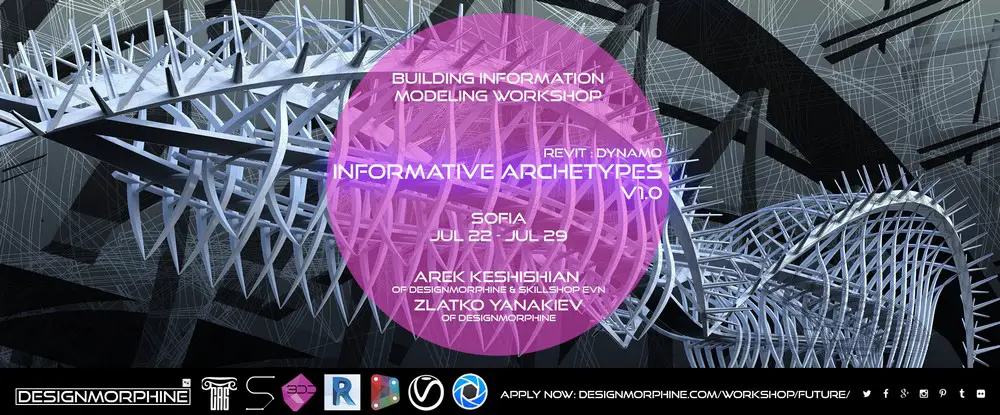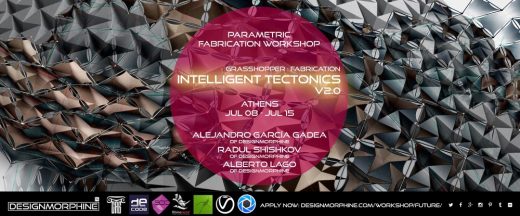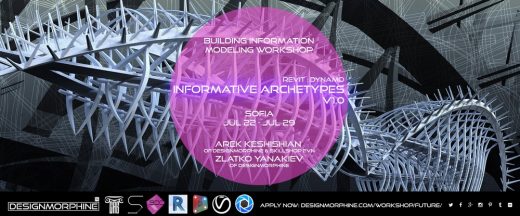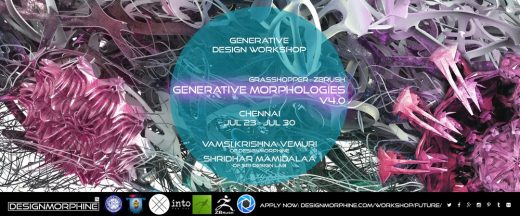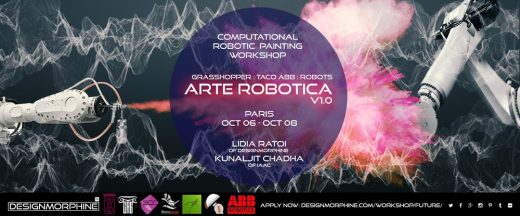DesignMorphine Events 2017, Architecture Workshops, Talks, Courses, News
DesignMorphine Events
Creative hub for design trough workshops, lectures, projects and explorations
12 Dec 2017
DesignMorphine
DesignMorphine is planning a scholarship project and would like to ask you to join us in our dream to help at least one very talented student.
DesignMorphine are doing workshops, courses and lectures since 2014 and during those years we have met more than thousands of students who seek their perfection in the field of architecture and design. Many of them cannot afford to study in a good architecture university. We are planning to support on our end with the starting amount of $1000 which is one student’s education fee in the beginning of 2018. The more money we can gain; the more students we can support.
DesignMorphine hope you will also be able to donate as much as you can afford. The student will be chosen through portfolio, motivational letter, and proof that they have been accepted to or are enrolled currently in a university. Each donor will have a vote toward which participating student deserves the scholarship. The scholarship will be announced on January 1st 2018.
2 Jul 2017
DesignMorphine Events in 2017
DesignMorphine Events
DesignMorphine is a creative hub for design trough workshops, lectures, projects and explorations in the field of architecture, design and arts. Their goal is to provide the essential elements of trending design practices in a condensed way. Their team is comprised of talented designers which give us an multidisciplinary approach to design and its education.
The firm have conducted over 30 workshops and courses in Europe, the Middle East and USA. Among them are successful collaborations with Harvard and MIT. They have planned workshops for Europe, Asia and USA.
Upcoming events:
Intelligent Tectonics V2.0, Athens:
Intelligent Tectonics V2.0 Workshop
8th – 15th July 2017, Athens
DESCRIPTION
INTELLIGENT TECTONICS V2.0 will focus on the application of computational design in form-finding design strategies and fabrication methodologies for membrane typologies, stretched across spatial rod-string structures. Participants will learn to use physics simulations, panelization techniques and optimization tools to design advanced computational forms, as well as achieving their material representations through digital fabrication methodologies.
Participants will revisit the compelling work of well-known architects on catenaries, minimal surfaces and tensegrity structures, to generate a series of physical and digital study models which inform a proposal for a permanent ceiling installation at the DeCode fablab in Athens. The final outcome will be a single built ceiling mounted structure by all the participants, which will result from the computational studies. The design will be digitally simulated and then fabricated and assembled by all students collectively. A complete journey from design, through experimentation to fabrication and construction.
This workshop is intended for architects, designers and artists at all skill levels interested in applied computational design strategies and their process from concept to reality.
APPLICATIONS
https://www.facebook.com/events/252821875168405/
DETAILS
Grasshopper and Rhinoceros will be the main tools to carry out studies on the final design scheme and fabrication. Students will be guided through the writing of parametric definitions in Grasshopper 3D, in order to create digital models of spatial systems.
Kangaroo will be the tool to develop digital simulations with particles and springs to create tensile physical systems and explore physical and digital design intuitions. In this digital environment, participants will be shown various ways to represent physical forces and their interactions with springs and anchor points that will recreate the construction of the membrane.
Structural analysis will be performed with Karamba3D in order to understand different stresses in the elements and thus chose rods or strings. Further optimization refinements will be achieved by introducing material properties in Karamba3D and optimizing them with Octopus.
The resulting design will be digitally detailed by additional parametric plug-ins and prepared for fabrication, using laser cutting and 3dprinting technology to have accurate control on the final components.
An important scope of the workshop will be the understanding of fabrication implications and structural practicality not as a final design stage but as part of the design process, the system will inform the outcome. In particular, the integration process will include merging different materials as well as two fabrication techniques for the development of component-based systems with a combination of flexible/rigid/locking joinery.
During the workshop participants will receive both theoretical knowledge of the relevant topics and a practical demonstration of material samples and fabrication methods.
WHAT YOU WILL LEARN
Advanced parametric modelling
• 3D modelling in Rhinoceros 5.0
• Introduction to Grasshopper and computational design
• Creating complex geometries and advanced computational strategies
• Panelization, subdivision and patterning with additional add-ons
• Structural optimization based on material behaviours and geometrical constrains
• Practical understanding of innovative techniques in computational design and digital fabrication
Form-finding and digital simulations
• Digital form-finding techniques with particle-springs using Kangaroo
• Digital structural simulation with Karamba3D
• Digital Fabrication techniques of complex geometries
• Digital simulations of built forms
Digital Fabrication
• Understanding material behaviour and its impact on the design process
• Data management for fabrication purposes
• Producing physical prototypes through digital fabrication
• 3dprinting and laser cutting techniques.
REQUIRED SOFTWARE
Each Participant should provide their own computer with the following software installed. If you do not have a software, trial versions can be found on each software company’s website. We will send participants links to the required software, trials, and plug-ins for download. Please have the software installed prior to workshop start. If you have issues installing software, we may be able to help you during the workshop.
• Rhinoceros 5.0
• Grasshopper 0.9
Plugins : Kangaroo ,WeaverBird, Lunchbox, FabTools ,MeshTools, Karamba3D, Octopus
• Keyshot
• Adobe Package : Photoshop, Illustrator, Premiere, Indesign
LOGISTICS
Intelligent Tectonics V2.0 will expand from 07th to 14th July, 2017.
Daily meetings will take place from 10:00 to 18:00 at Agiou Thoma 9 and Halkidonos 52 corner, Athens, Greece.
Participants will first work individually and then be combined into groups.
There will be a final presentation of your groups work containing renderings and diagrams on 14 July, 2017.
All projects will be published on DesignMorphine’s web page.
All participants who complete the workshop will receive a certificate of completion.
For attending the workshop and intensive courses there is no previous software experience required.
Participants need to bring their own laptops or workstations.
Please note that places are very limited on a first pay first serve basis!
TUTORS
Alejandro Garcia Gadea
of DesignMorphine
Radul Shishkov
of DesignMorphine
Alberto Lago
of DesignMorphine
https://www.facebook.com/events/252821875168405/
Informative Archetypes V1.0, Sofia, Bulgaria:
Informed Archetypes V1.0 Workshop
15 – 21 July 2017, Sofia
DESCRIPTION
Integrative design workshop focusing on implementing BIM methods to conceptualize bridges and pathways.
Students will explore an actual site in the vicinity of city of Sofia and get acquainted with specific site phenomena. Based on overall geometry, a parametric system is to be designed regarding architectural aspects of the site.
The workshop will take off from making self-aware BIM Families using intelligent Parameters and slide all the way through integrating them as elements to assemble the final geometry.
Teaming – teaming is based on “families” made by each participant. Further, teams will devise a spatial concept – a theme regarding their combined chosen design factors. A team’s theme will consist of logical cores – the previously chosen factors – and will be used as a guideline and purpose of the design.
Formative Geometry. As well as controlling Family Parameters the team’s chosen parameters can be used to derive an overall geometrical concept.
Each generated geometry will have
1.Main road/pathway
2.Structural parts
3.Detail elements. Such as a paneling system.
4.Control of elements via parameters
Participants will be exposed to an atmosphere of exploration on the aesthetic potential of such design processes and learn to present their work in an intriguing graphical manner.
DETAILS
BIM design techniques
Participants will be introduced to BIM, learn how BIM can be integrated with external references, its advantages compared to other computer-aided design methods.
Participants will be provided with a 3D model of the same and a data-set regarding the site and learn how to inform design workflow using that data.
Based on Data
As a bonus, some environment analysis tools and methods will be introduced in order to recreate a sufficient description of site-specific factors. The input data could also be for structural or even pure aesthetic purposes.
Parameterizing a BIM system
Setting on baseline geometry and conditions of site, participants will further elaborate into the BIM-specific workflow utilizing parametric families and nested types. Procedural control of Revit families through Dynamo would allow highly responsive and informed system.
WHAT YOU WILL LEARN
Revit
• Revit UI
• Revit Families and Types
• In-Place Components and Massing
• Adaptive Components
• Scheduling
Dynamo
• Dynamo: UI Basic functions – selection, creation, operation
• Elements – points, curves, surfaces and solids
• Placement of Adaptive components using Dynamo
• Revit geometry from Dynamo geometry
• DesignScript and Python nodes
REQUIRED SOFTWARE
Each Participant should provide their own computer with the following software installed. If you do not have a software, trial versions can be found on each software company’s website. We will send participants links to the required software, trials, and plug-ins for download. Please have the software installed prior to workshop start. If you have issues installing software, we may be able to help you during the workshop.
• Latest version Autodesk Revit
• Latest version Dynamo for Revit
LOGISTICS
Intro to BIM with Revit and Dynamo V1.0 will expand from 15 to 16 July, 2017.
Intro to BIM with Revit and Dynamo V1.0 is included in but may be taken separately from:
• Informed Archetypes V1.0 from 15 to 21 July, 2017.
Daily meetings will take place from 10:00 to 18:00 at the Union of the Architects in Bulgaria, Krakra 11 str., Sofia.
Participants will first work individually and then be combined into groups.
There will be a final presentation of your groups work containing renderings and diagrams on 27 July, 2017.
All projects will be published on DesignMorphine’s web page.
All participants who complete the workshop will receive a certificate of completion.
For attending the workshop and intensive courses there is no previous software experience required.
Participants need to bring their own laptops or workstations.
Please note that places are very limited on a first pay first serve basis!
PROGRAM OF THE WORKSHOP
15.07 Saturday_ Intro to BIM with Revit
09.00_Software Installation
10.00_ Intro to BIM, UI, Conceptual Massing Environment, Family types – Arek Kesh
13.00_Lunch Break
14.00_ Adaptive Components, Parameter Types, Formulas – Botyo Dimitrov
16.00_ Nesting, Kinetic Example, Scheduling
16.07_ Sunday_ Intensive Course Day 2
10.00_ Dynamo UI, Nodes, Data Management, Basic Example – Botyo Dimitrov
13.00_Lunch Break
14.00_ Revit elements in Dynamo, CAD relation, Directshape – Arek Kesh
16.00_ DesignScript and Python – Botyo Dimitrov
17.00_ Example implementing Kinetic components on a bridge informed by solar analysis data and scheduling
18.00_Introduction to Main Workshop
17.07 Monday_ Workshop Day 1
10.00_ Site Visit
13.00_ Lunch Break
14.00_ Modeling of Adaptive Families using Dynamo – Arek Kesh
16.00_ Recursion in Dynamo. Interpolation of data points and setting base geometry with Dynamo – Botyo Dimitrov
18.00_Working Session
Participants have to provide 2-4 Families each. Parameters in Families may correspond to site factor provided.
Participants will have analyzed the site with charts and diagrams (each participant will provide 2 diagrams of factor by their choice).
Participants assigned micro or macro responsibilities and teaming based on that.
18.07_ Tuesday_Workshop Day 2
10.00_ Introduction to Ladybug and environmental data analysis – Ladybug
13.00_ Lunch Break
14.00_ Complete example of a bridge – Arek | Botyo
16.00_ Informing the model with environmental data
18.00_ Working session
21.00_ Project Review
Participants will use the Dynamo interpolation scripts to custom-built their base geometry. Further participants will start populating the base geometry with Families they have separately modeled.
Each team has to devise a THEME of their design. (A THEME is consisted of at least 4 logical cores, each regarding certain data type. For instance a logical core is humidity – the way humidity changes over space or time)
19.07 Wednesday_ Workshop Day 3
10.00_ View creation (Such as perspective sections and displacement views) – Botyo Dimitrov
11.30_ Aesthetic treatment of views (Graphic Display options, Visbility/Graphics, Shadows) – Arek Kesh
13.00_Lunch Break
14.00_ Rendering (Either Keyshot, or V-ray for Revit)
16.00_ Working Session
Each two hours Project Review
Participants will present the scripts that should enough flexibility to produce various variables of the final product, a relatively matured level of the bridge design should be discussed at a level where there’s a few fixes left to be worked on before final presentation board assembly.
20.07 Thursday_ Workshop Day 4
10.00_ Full work day (Review before lunch break)
13.00_Lunch Break
14.00_Working Session towards presentation/Boards
18.00_Project Review
Participants should provide final presentation boards consisting of a minimum of three sheets and a PowerPoint presentation. Sheets should include a “Moneyshot” render, diagrams of design concept and process specifically showcasing the impact of environmental factors, algorithms implemented and overall concept, at least partial documentation and scheduling of the project should be included, along with visually intriguing graphics, 2D and 3D drawings of the geometry.
21.07 Friday_ Workshop Day 5_ Final Presentation
18.00_Final presentation of works with live broadcast on social media in front of jury and guests.
*Please note that the program is flexible and will be adjusted and updated according to the needs and progression of the Workshop.
*Additional Requirements:
• 1 black and white head shot photo per tutor / assistant
• Min 10 relevant images per tutor for promotion purposes
• 1 video (template will be sent)
https://www.facebook.com/events/646454095561374/
Generative Morphologies V4.0, India
Generative Morphologies V4.0 Workshop
23rd – 30th July 2017, Chennai, India
DESCRIPTION
Generative Morphologies V4.0 is an International Workshop intended for Architects, students of Architecture and urbanism, professional designers and artists exploring Advanced contemporary algorithmic generative systems at an Urban scale of a City. Its aimed at establishing a platform of learning new techniques of design, production and presentation; to feel the workflow of some of the top ranked Architectural universities. As the advancement of Architecture and design is steering towards an era of computation, the abundance of the big data has laid an unexhausted arena of possibilities for generative systems.
We intend to analyze the different evolutionary and self-organizational patterns and growth of an Urban contexture, where the city becomes the key and its constituent elements formulate themselves as the design drivers. Participants study and analyze the Urban setting, George Town at Chennai, India, from where they extract this data and manifest them into adaptive Architectural solutions through the generative processes that grow in response to their contextual environment.
The participants will develop advanced design skills and workflow that is applicable on a macro to micro scales ranging in different design disciplines. The workshop works with the domain of producing a Portfolio ready project by the completion of course.
APPLICATIONS
http://designmorphine.com/workshop/future/generative-morphologies-v4/
https://www.facebook.com/events/272104006572188/
DETAILS
Generative Morphologies V4.0 will computationally address “Morphologic Metropolis”, a Growth and data driven phenomenon of the city as an ecological organism adapting to an environmental stimulus. The generative system is formulated with a general workflow that primarily focuses on Anemone (Plugin for Grasshopper), along with a range of techniques in a streamline process across two major software platforms Grasshopper & Zbrush.
This workshop will run using Mcneel Rhinoceros & Grasshopper 3D+ Plugins, Pixologic Zbrush, Luxion Keyshot.
WHAT YOU WILL LEARN
• Understanding of macro morphologies and adaptive architectural systems
• Introduction in Rhino 3D, Grasshopper, Zbrush
• Introduction to Generative design in Anemone, Cocoon, Octopus (Plugins for GH)
• Introduction to mesh manipulation, texturing, optimization in Zbrush
• Introduction to mesh modelling in Grasshopper from points with cocoon and smoothness in weaverbird.
• Strategies for 3D Printing
• Visualization with Luxion keyshot
• Discussions on Project presentation
REQUIRED SOFTWARE
Each Participant should provide their own computer with the following software installed. If you do not have a software, trial versions can be found on each software company’s website. We will send participants links to the required software, trials, and plug-ins for download. Please have the software installed prior to workshop start. If you have issues installing software, we may be able to help you during the workshop.
• Rhinceros 3D
• Grasshopper (Plugins: Anemone, Octopus, Weaverbird, Cocoon, Culebra)
• Pixologic Zbrush
• Luxion Keyshot
• Adobe Suite
TUTORS
Vamsi Krishna Vemuri / India
Shridhar Mamidaala / India
https://www.facebook.com/events/272104006572188/
Arte Robotica V1.0, Paris
06th – 08th October 2017, Paris, France
Arte Robotica V.01
DESCRIPTION
The Arte Robotica Workshop proposes a reinterpretation of Dadaist concepts, by creating art pieces with the use of an industrial robot. Tristan Tzara’s „To make a Dadaist Poem” was a true manifesto towards the renewal of art, and an invitation to the first manifestations of controlled chaos.
To make a Dadaist poem:
• Take a newspaper.
• Take a pair of scissors.
• Choose an article as long as you are planning to make your poem.
• Cut out the article.
• Then cut out each of the words that make up this article and put them in a bag.
• Shake it gently.
• Then take out the scraps one after the other in the order in which they left the bag.
• Copy conscientiously.
• The poem will be like you.
• And here are you a writer, infinitely original and endowed with a sensibility that is charming though beyond the understanding of the vulgar.
Computational design and digital fabrication are associated with precise, effective and optimized strategies, tools used towards enhancing design and fabrications processes. But what if they become art, under the aegis of randomness?
The true beauty of digitalism lies in the fact that it is utopian, freed by constraints. Reality plays no role in it – only imagination. By using digital manipulation and fabrication, one can find an entirely new alphabet of expression. The Arte Robotica Workshop proposes a reinterpretation of Dadaist concepts, by creating art pieces with the use of an industrial robot.
DETAILS
By gathering real-time data from sound waves, a series of patterns will be generated algorithmically. Through computational tricks, the original patterns will be distorted and will generate a path for the robot arm.
While in traditional painting the canvas is still and the color source moves, we propose the inverted situation – three static “color sources” will be placed in front of the robot. One will be a spray paint, the other a scrapping instrument, while the third will be a marker-type brush. The transparent canvas will be mounted on the robot, and will move according to the sound-wave patterns, thus creating a painting that is in no way predictable, yet totally controlled. Therefore, you are not able to see what is being painted, but you can only introduce the parameters and see the end result.
The impromptu “painting” will be designing itself on an almost imaginary canvas, which is constantly changing the parameters of the design as it moves itself. The precision of the tool is always succumbed to the authority of the randomness of the movement patterns.
WHAT YOU WILL LEARN
· Rhino, Grasshopper & Taco
· Working with an ABB Robot Arm
· Post Processing
· End Effectors (tooling)
· Logistics for the set-up (system for static color sources)
· Photoshop
· After Effects
REQUIRED SOFTWARE
Each Participant should provide their own windows computer with the following software installed. If you do not have a software, trial versions can be found on each software company’s website. We will send participants links to the required software, trials, and plug-ins for download. Please have the software installed prior to workshop start. If you have issues installing software, we may be able to help you during the workshop.
· Rhino, Grasshopper & Taco
· Adobe Creative Suite
https://www.facebook.com/events/134736850412156
Intelligent Tectonics v2 Event in Athens, Greece
8 – 15 Jul 2017
Location: various – eg Athens, Greece or Paris, France
Architecture in London
Contemporary Architecture in London
London Architecture Links – chronological list
London Architecture Walking Tours
City of London Buildings
Comments / photos for DesignMorphine Events page welcome
Website: DesignMorphine Architecture Events

